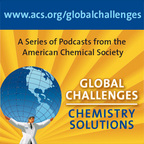
Global Challenges/Chemistry Solutions
Summary: Taking inspiration from trees, scientists have developed a battery made from a sliver of wood coated with tin that shows promise for becoming a tiny, long-lasting, efficient and environmentally friendly energy source. Their report on the device — 1,000 times thinner than a sheet of paper — appears in the journal Nano Letters.
- Visit Website
- RSS
- Artist: American Chemical Society
Podcasts:
In remote regions of the world where electricity is hard to come by and scientific instruments are even scarcer, conducting medical tests at a doctor’s office or medical lab is rarely an option. Scientists are now reporting progress toward an inexpensive point-of-care, paper-based device to fill that void with no electronics required. Their study on the extremely sensitive test, which simply relies on the user keeping track of time, appears in the ACS journal Analytical Chemistry.
With the “green” reputation of large hydroelectric dams already in question, scientists are reporting that millions of smaller dams on rivers around the world make an important contribution to the greenhouse gases linked to global climate change. Their study, showing that more methane than previously believed bubbles out of the water behind small dams, appears in ACS’ journal Environmental Science and Technology.
As the Fukushima crisis continues to remind the world of the potential dangers of nuclear disposal and unforeseen accidents, scientists are reporting progress toward a new way to detect the radioactive materials uranium and plutonium in waste water. Their report on the design of a highly sensitive nanosensor appears in ACS’ The Journal of Physical Chemistry C.
Scientists are reporting an advance in smartphone-based imaging that could help physicians in far-flung and resource-limited locations monitor how well treatments for infections are working by detecting, for the first time, individual viruses. Their study on the light-weight device, which converts the phone into a powerful mini-microscope, appears in the journal ACS Nano.
A new process can convert a wide variety of vegetable and animal fats and oils — ranging from lard to waste cooking oil — into a key ingredient for making plastics that currently comes from petroleum, scientists say. Their report on the first-of-its-kind process appears in the journal ACS Sustainable Chemistry and Engineering.
Energy conservation in a small number of households could go a long way to reducing greenhouse gas emissions, scientists are reporting. Their study, which measured differences in energy demands at the household level, appears in the ACS journal Environmental Science and Technology.
Scientists are reporting development and successful lab tests on the first potential drug to pack a lethal one-two punch against melanoma skin cancer cells. Hit number one destroys cells in the main tumor, and the second hit blocks the spread of the cancer to other sites in the body, according to their report in the journal ACS Chemical Biology.
Scientists are reporting development and successful lab tests on the first potential drug to pack a lethal one-two punch against melanoma skin cancer cells. Hit number one destroys cells in the main tumor, and the second hit blocks the spread of the cancer to other sites in the body, according to their report in the journal ACS Chemical Biology.
The search for a less-expensive, sustainable source of biomass, or plant material, for producing gasoline, diesel and jet fuel has led scientists to duckweed, that fast-growing floating plant that turns ponds and lakes green. That’s the topic of a report in ACS’ journal Industrial and Engineering Chemistry Research.
With the Deepwater Horizon disaster emphasizing the need for better ways of cleaning up oil spills, scientists are reporting that unprocessed, raw cotton may be an ideal, ecologically friendly answer, with an amazing ability to sop up oil. Their report, which includes some of the first scientific data on unprocessed, raw cotton’s use in crude oil spills, appears in the ACS journal Industrial and Engineering Chemistry Research.
Using the same devious mechanism that enables some bacteria to shrug off powerful antibiotics, scientists have developed solar-powered nanofilters that remove antibiotics from the water in lakes and rivers twice as efficiently as the best existing technology. Their report appears in ACS’ journal NanoLetters.
An innovative new process that releases the energy in coal without burning — while capturing carbon dioxide, the major greenhouse gas — has passed a milestone on the route to possible commercial use, scientists are reporting. Their study in the ACS journal Energy and Fuels describes results of a successful 200-hour test on a sub-pilot scale version of the technology using two inexpensive but highly polluting forms of coal.
Some people may joke about living on caffeine, but scientists now have genetically engineered E. coli bacteria to do that — literally. Their report in the journal ACS Synthetic Biology describes bacteria being “addicted” to caffeine in a way that promises practical uses ranging from decontamination of wastewater to bioproduction of medications for asthma.
It may be the 21st century, with all its technological marvels, but 6 out of every 10 people on Earth still do not have access to flush toilets or other adequate sanitation that protects the user and the surrounding community from harmful health effects, a new study has found. The research, published in ACS’ journal Environmental Science and Technology, says the number of people without access to improved sanitation is almost double the previous estimate.
Today’s episode describes the first mobile application to foster wider use of the environmentally friendly and sustainable principles of green chemistry. It is the topic of a report in ACS’ new journal, ACS Sustainable Chemistry and Engineering. The report on the pigment appears in ACS' Journal of the American Chemical Society.